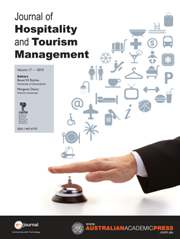Article contents
Tourism and Hospitality Research Student Experiences: How to Achieve Quality, Inclusivity and Belongingness
Published online by Cambridge University Press: 23 February 2012
Abstract
What constitutes a quality research student learning experience? Using an interpretive social sciences approach, the tradition of autoethnography and the interpretive processes of reflexivity and constructivist grounded theory, the individual and collective lived research student experiences of three students were constructed/interpreted and (re)constructed/(re)interpreted to provide insights into answers to this question. Each student had completed one research program and, at the time of publication, was currently enrolled in a doctoral program. Based on these three students' autoethnographies, quality research student experiences engender personal, social, supervisor, research profession, learning communities and other life connectivities. These connectivities are generated through conducive conditions for learning, communities of practice and inclusive research cultures wherein research students experience and do research in order to become researchers, and to belong to research communities.
Keywords
- Type
- Articles
- Information
- Journal of Hospitality and Tourism Management , Volume 16 , Issue 1 , 01 January 2009 , pp. 139 - 147
- Copyright
- Copyright © Cambridge University Press 2009
- 3
- Cited by


